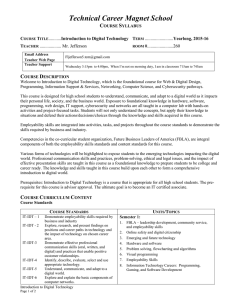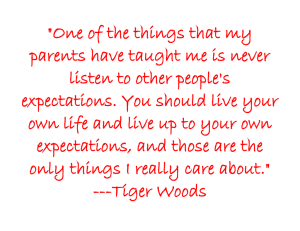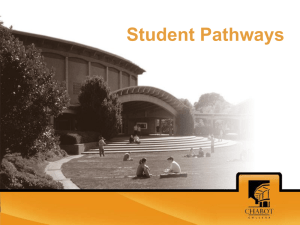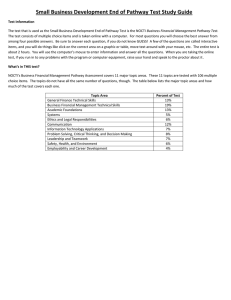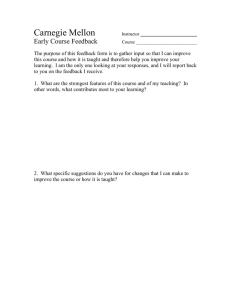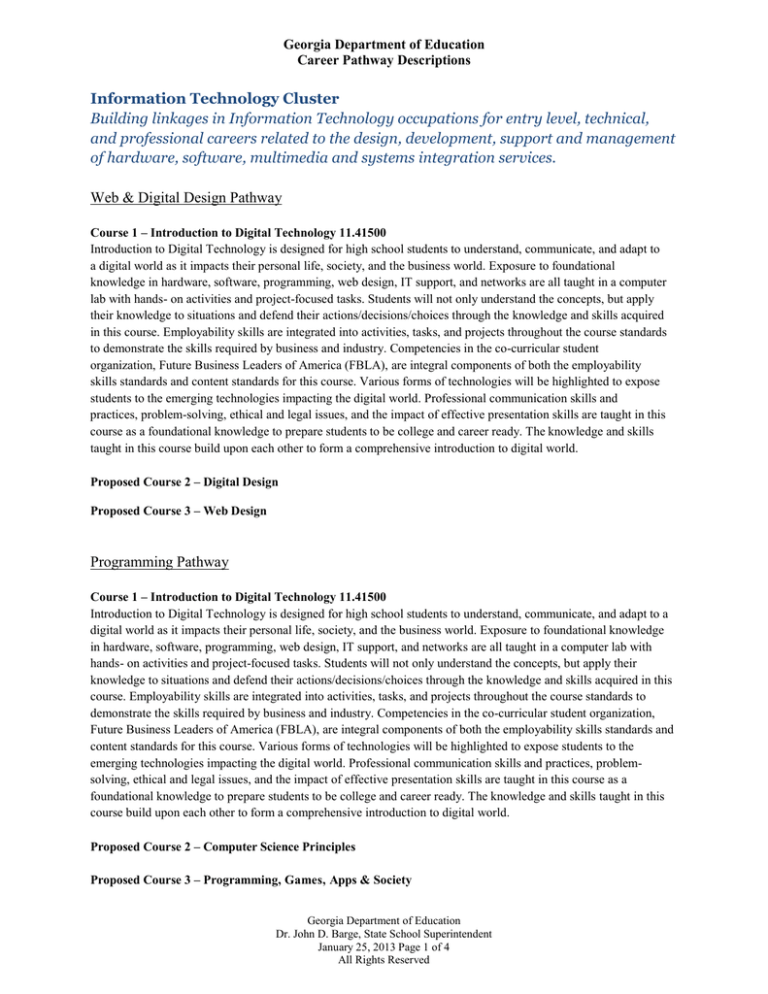
Georgia Department of Education
Career Pathway Descriptions
Information Technology Cluster
Building linkages in Information Technology occupations for entry level, technical,
and professional careers related to the design, development, support and management
of hardware, software, multimedia and systems integration services.
Web & Digital Design Pathway
Course 1 – Introduction to Digital Technology 11.41500
Introduction to Digital Technology is designed for high school students to understand, communicate, and adapt to
a digital world as it impacts their personal life, society, and the business world. Exposure to foundational
knowledge in hardware, software, programming, web design, IT support, and networks are all taught in a computer
lab with hands- on activities and project-focused tasks. Students will not only understand the concepts, but apply
their knowledge to situations and defend their actions/decisions/choices through the knowledge and skills acquired
in this course. Employability skills are integrated into activities, tasks, and projects throughout the course standards
to demonstrate the skills required by business and industry. Competencies in the co-curricular student
organization, Future Business Leaders of America (FBLA), are integral components of both the employability
skills standards and content standards for this course. Various forms of technologies will be highlighted to expose
students to the emerging technologies impacting the digital world. Professional communication skills and
practices, problem-solving, ethical and legal issues, and the impact of effective presentation skills are taught in this
course as a foundational knowledge to prepare students to be college and career ready. The knowledge and skills
taught in this course build upon each other to form a comprehensive introduction to digital world.
Proposed Course 2 – Digital Design
Proposed Course 3 – Web Design
Programming Pathway
Course 1 – Introduction to Digital Technology 11.41500
Introduction to Digital Technology is designed for high school students to understand, communicate, and adapt to a
digital world as it impacts their personal life, society, and the business world. Exposure to foundational knowledge
in hardware, software, programming, web design, IT support, and networks are all taught in a computer lab with
hands- on activities and project-focused tasks. Students will not only understand the concepts, but apply their
knowledge to situations and defend their actions/decisions/choices through the knowledge and skills acquired in this
course. Employability skills are integrated into activities, tasks, and projects throughout the course standards to
demonstrate the skills required by business and industry. Competencies in the co-curricular student organization,
Future Business Leaders of America (FBLA), are integral components of both the employability skills standards and
content standards for this course. Various forms of technologies will be highlighted to expose students to the
emerging technologies impacting the digital world. Professional communication skills and practices, problemsolving, ethical and legal issues, and the impact of effective presentation skills are taught in this course as a
foundational knowledge to prepare students to be college and career ready. The knowledge and skills taught in this
course build upon each other to form a comprehensive introduction to digital world.
Proposed Course 2 – Computer Science Principles
Proposed Course 3 – Programming, Games, Apps & Society
Georgia Department of Education
Dr. John D. Barge, State School Superintendent
January 25, 2013 Page 1 of 4
All Rights Reserved
Georgia Department of Education
Career Pathway Descriptions
Computer Science Pathway
Course 1 – Introduction to Digital Technology 11.41500
Introduction to Digital Technology is designed for high school students to understand, communicate, and adapt to
a digital world as it impacts their personal life, society, and the business world. Exposure to foundational
knowledge in hardware, software, programming, web design, IT support, and networks are all taught in a computer
lab with hands-on activities and project-focused tasks. Students will not only understand the concepts, but apply
their knowledge to situations and defend their actions/decisions/choices through the knowledge and skills acquired
in this course. Employability skills are integrated into activities, tasks, and projects throughout the course standards
to demonstrate the skills required by business and industry. Competencies in the co-curricular student
organization, Future Business Leaders of America (FBLA), are integral components of both the employability
skills standards and content standards for this course. Various forms of technologies will be highlighted to expose
students to the emerging technologies impacting the digital world. Professional communication skills and
practices, problem-solving, ethical and legal issues, and the impact of effective presentation skills are taught in this
course as a foundational knowledge to prepare students to be college and career ready. The knowledge and skills
taught in this course build upon each other to form a comprehensive introduction to digital world.
Proposed Course 2 – Computer Science Principles
Proposed Course 3 – AP Computer Science 11.01600
The AP Computer Science course emphasizes object-oriented programming methodology with a concentration on
problem solving and algorithm development. This course is meant to be the equivalent of a first-semester collegelevel course in computer science. It also includes the study of data structures, design, and abstraction. Emphasis in the
course is on procedural and data abstraction, object-oriented programming and design methodology, algorithms, and
data structures.
The College Board’s Advanced Placement Program (AP) has partnered with colleges, universities, and high schools
to provide students with the opportunity to take college-level course work and exams while still in high school.
Culminating in a rigorous exam, AP provides motivated and academically prepared students with the opportunity to
earn college credit or placement and helps them stand out in the college admissions process.
Because the design and implementation of computer programs to solve problems involve skills that are fundamental
to the study of computer science, a large part of the course is built around the development of computer programs that
correctly solve a given problem. These programs should be understandable, adaptable, and, when appropriate,
reusable. At the same time, the design and implementation of computer programs is used as a context for introducing
other important aspects of computer science, including the development and analysis of algorithms, the development
and use of fundamental data structures, the study of standard algorithms and typical applications, and the use of logic
and formal methods. In addition, the responsible use of these systems is an integral part of the course.
Current offerings of the AP Computer Science A Exam require the use of Java. For additional information and
updates regarding the AP Computer Science course, please access https://apstudent.collegeboard.org/apcourse
AP Computer Science is the final course in the Computer Science pathway in the Information Technology Cluster.
Students enrolled in this course who are working to complete the pathway should have successfully completed
Introduction to Digital Technology and Computer Science Principles.
Georgia Department of Education
Dr. John D. Barge, State School Superintendent
January 25, 2013 Page 2 of 4
All Rights Reserved
Georgia Department of Education
Career Pathway Descriptions
Information Support & Services Pathway
Course 1 – Introduction to Digital Technology 11.41500
Introduction to Digital Technology is designed for high school students to understand, communicate, and adapt to a
digital world as it impacts their personal life, society, and the business world. Exposure to foundational knowledge
in hardware, software, programming, web design, IT support, and networks are all taught in a computer lab with
hands- on activities and project-focused tasks. Students will not only understand the concepts, but apply their
knowledge to situations and defend their actions/decisions/choices through the knowledge and skills acquired in this
course. Employability skills are integrated into activities, tasks, and projects throughout the course standards to
demonstrate the skills required by business and industry. Competencies in the co-curricular student organization,
Future Business Leaders of America (FBLA), are integral components of both the employability skills standards and
content standards for this course. Various forms of technologies will be highlighted to expose students to the
emerging technologies impacting the digital world. Professional communication skills and practices, problemsolving, ethical and legal issues, and the impact of effective presentation skills are taught in this course as a
foundational knowledge to prepare students to be college and career ready. The knowledge and skills taught in this
course build upon each other to form a comprehensive introduction to digital world.
Proposed Course 2 – IT Essentials
Proposed Course 3 – IT Support
Network Systems Pathway
Course 1 – Introduction to Digital Technology 11.41500
Introduction to Digital Technology is designed for high school students to understand, communicate, and adapt to a
digital world as it impacts their personal life, society, and the business world. Exposure to foundational knowledge
in hardware, software, programming, web design, IT support, and networks are all taught in a computer lab with
hands- on activities and project-focused tasks. Students will not only understand the concepts, but apply their
knowledge to situations and defend their actions/decisions/choices through the knowledge and skills acquired in this
course. Employability skills are integrated into activities, tasks, and projects throughout the course standards to
demonstrate the skills required by business and industry. Competencies in the co-curricular student organization,
Future Business Leaders of America (FBLA), are integral components of both the employability skills standards and
content standards for this course. Various forms of technologies will be highlighted to expose students to the
emerging technologies impacting the digital world. Professional communication skills and practices, problemsolving, ethical and legal issues, and the impact of effective presentation skills are taught in this course as a
foundational knowledge to prepare students to be college and career ready. The knowledge and skills taught in this
course build upon each other to form a comprehensive introduction to digital world.
Proposed Course 2 – Networking Fundamentals
Proposed Course 3 – Networking Systems & Support
Georgia Department of Education
Dr. John D. Barge, State School Superintendent
January 25, 2013 Page 3 of 4
All Rights Reserved
Georgia Department of Education
Career Pathway Descriptions
Health IT Pathway
Course 1 – Introduction to Healthcare Science 25.52100
Introduction to Healthcare Science is the foundational course for all Health Science pathways and is a prerequisite
for all other Healthcare Science pathway courses. It is appropriate for students wishing to pursue a career in the
Healthcare Industry. The course will enable students to receive initial exposure to Healthcare Science careers as well
as employability and communication skills necessary in the healthcare industry. The concepts of human growth and
development, health, wellness, and preventative care are evaluated, as well as, legal, ethical and technology
responsibilities of today’s healthcare provider. Fundamental healthcare skills development is initiated including
microbiology, basic life support and first aid. Students are required to meet both national and intrastate professional
guidelines as designated by applicable regulatory agencies such as the Occupational Health and Safety
Administration (OSHA) and Center for Disease Control (CDC). Mastery of these standards through project- based
learning, technical skills practice, and leadership development activities of the career and technical student
organization HOSA, Future Health Professionals, will provide students with a competitive edge to be the better
candidate for either entry into the healthcare global marketplace and/or the post-secondary institution of their choice
to continue their education and training.
Proposed Course 2 – Essentials of Health IT
Proposed Course 3 – Applications of Health IT/Healthcare
For more information, please contact Misty Freeman at mfreeman@doe.k12.ga.us
Georgia Department of Education
Dr. John D. Barge, State School Superintendent
January 25, 2013 Page 4 of 4
All Rights Reserved

